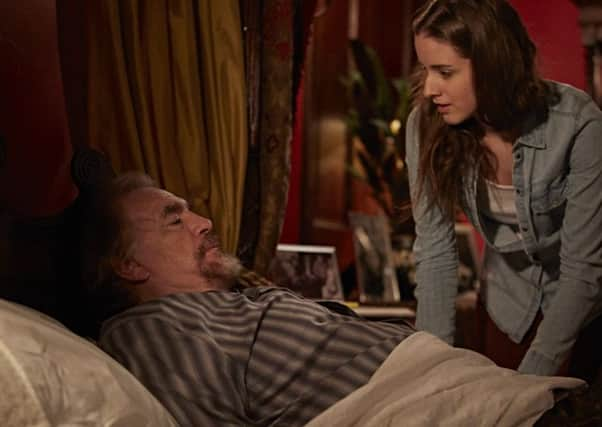Film reviews: The Carer | Sweet Bean | Author: The JT Leroy Story


The Carer (15) | Rating: ***
Sweet Bean (PG) | Rating: ****
Author: The JT Leroy Story (15) | Rating: ****
As a veteran actor battling Parkinson’s and mediocrity, Brian Cox gets to have his cake and eat it in The Carer, an enjoyably indulgent comedy/drama that sends up the high self-regard of his profession while showcasing his own talents as an actor. He plays Sir Michael Gifford, a classically trained star of stage and screen whose debilitating condition has robbed him of his independence and left him resentful of daughter Sophia’s (Emilia Fox) officious efforts to manage his life, legacy and finances. Despondent, irascible and egotistical, he’s prone to displays of pomposity with his few remaining friends and takes his loss of vitality out on caregivers who rarely last long in the job. When Sophia hires a young Hungarian woman called Dorrotya (Coco König), however, he soon meets his match, but also discovers a potential ally as Dorrotya’s own acting aspirations come to the fore.
What follows may be fairly predictable stuff (the plot itself is broadly reminiscent of Venus, starring Peter O’Toole, from 2006), but the film has charm enough thanks largely to the performances. Originated from a script by the late Scottish-born author, screenwriter and critic Gilbert Adair (The Dreamers), the relationship between Sir Michael and Dorrotya is nicely drawn and König more than holds her own against Cox, particularly as his initial hostility gives way to a more conspiratorial friendship built upon a mischievous desire to defy a world all too ready to write them both off. Director János Edelényi keeps the sentimentality mostly in check too, in part by refusing to shy away from the dignity destroying effects of Parkinson’s, but mostly by giving Cox plenty of room to luxuriate in his character’s bad behaviour. Cox certainly seems to be having a blast and, despite some of the plot details in the latter stages stretching credulity to breaking point, his sense of playfulness makes it easy to forgive any shortcomings.
Advertisement
Hide AdIntergenerational alliances are the heart of Sweet Bean too, but this latest film from Naomi Kawasi is a much gentler and more meditative affair, one that may embrace a few of the more common clichés of Japan’s national cinema (cherry blossom, food metaphors and a taciturn male lead feature prominently), but does so to tell a deceptively simple story in way that’s moving without being overtly manipulative. It’s certainly less oblique than Kawasi’s previous film, the beautiful but baffling Still the Water, which came out this time last year.
Set on the margins of Tokyo, it revolves around Santoro (Masatoshi Nagasi), the middle-aged manager of a small eatery selling dorayaki pancakes to the locals. Though devoted to his work, it soon becomes clear that it’s the routine rather than the end product that drives him. That all changes when 76-year-old Tokue comes along hoping he’ll hire her for a part-time position. Played by the wonderful Kirin Kiki (last seen in Hirokazu Koreeda’s Our Little Sister earlier this year), Tokue’s enthusiasm is disarming, but Sontaro – too intent on cutting himself off from the world around him – repeatedly declines to hire her, fearing the work will be too strenuous for her crippled hands. But when he samples her sweet red bean paste and discovers the homemade concoction compliments the dorayaki far more effectively than the commercial paste he’s been using, he gives her the job and finds his life undergoing a quiet transformation as Tokue imparts life-lessons via food preparation. If that sounds hackneyed on paper, it’s not on screen. We soon discover that Tokue has been forced to spend much of her life in a colony for sufferers of Hansen’s disease, or leprosy, and as Sontaro learns more about her stigmatised life, Kawasi builds on the simple metaphorical significance of the set-up to tease out a much deeper and more compassionate study of the way our natural inclination to shun the marginalised in society diminishes us as a whole.
A decade ago the cult novelist JT LeRoy became a cause célèbre when it was revealed that this supposed transgender son of a truck-stop prostitute, who wrote gritty stories about life on the fringes, was really Laura Albert, a 30-something mother with her own troubled history. Viewing LeRoy as a “fictional avatar” through which she could address themes she wasn’t comfortable writing about under her own name, Albert was unusual in her use of a pseudonym only in terms of the lengths to which she went to construct a biography and public persona for her pen name. As LeRoy’s cult stardom grew, for instance, she sent her androgynous sister-in-law, Savanah Knoop, out into the world in wig and sunglasses, while she herself adopted a pretty unconvincing English accent and pretended to be LeRoy’s assistant. Author: The JT LeRoy Story gives us Albert’s side of the story and while that eradicates any pretence of objectivity, it also makes for fascinating viewing, offering a more sensitive counterpoint to the efforts of various news organisations to brand what she did an elaborate and cynically motivated hoax. Director Jeff Feuerzeig (The Devil and Daniel Johnston) may leave a few questions maddeningly out of reach, but he does so to get at something much more interesting. As we become party to the cadre of hipster celebrities (and Bono) who championed LeRoy’s work – sometimes sincerely, sometimes basking in the reflected credibility that came with being associated with such poetically truthful writing – the film becomes a meditation on our cultural addiction to authenticity in art, or more accurately, our addiction to the kind of authenticity that’s easy to romanticise, market and make movies about.